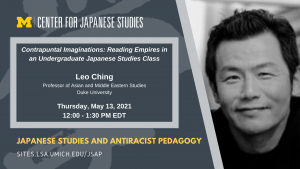Presented By: Center for Japanese Studies
Japanese Studies and Antiracist Pedagogy | Contrapuntal Imaginations: Reading Empires in an Undergraduate Japanese Studies Class
Leo Ching, Professor of Asian and Middle Eastern Studies, Duke University

Advance registration for this Zoom webinar is required:
https://umich.zoom.us/webinar/register/WN_p_LRbqtuSGiVocVOSEtodQ
Part of the Japanese Studies and Antiracist Pedagogy webinar series:
https://sites.lsa.umich.edu/jsap/webinars/
In Culture and Imperialism (1993), Edward Said introduces the term, contrapuntal reading, as a method to analyze the imbrication between metropolitan and colonial literary texts in the empire. By reading texts contrapuntally, Said argues, we are in a better position to understand the presence of colonialism in British novels such as the reference to Australia in David Copperfield or India in Jane Eyre. Furthermore, contrapuntal reading must take account of both processes, that of imperialism and that of resistance to it. This method of reading is still relevant and can serve as a corrective to today’s liberal discourse of inclusion and diversity. Current DEI efforts in the universities, corporations and elsewhere as a result of systemic racism and exclusion laid bare by the pandemic and police violence are commendable, but have their limits. Much like the push for multiculturalism in an earlier conjuncture, the liberal discourse of DEI runs the risk of reifying differences and (un)consciously upholds the status quo without interrogating and dismantling the very system that made those differences possible in the first place. In the gesture of acceptance and tolerance, liberalism continues to sustain white privilege and espouse colonial benevolence. And if we can place postwar liberalism as the dominant ideology in the United States responsible for establishing Area Studies as part of its anti-Communist effort, a benign racism has been fundamental to the formation of our disciplines and knowledge production.
Contrapuntal reading, I suggest, is useful in understanding the constituting and co-figuring of metropolitan and colonial relations that while addressing the minoritarian position of the colonized, does not normalize the status of the colonizer. Furthermore, contrapuntal reading can be extended to analyze the transition and translation between empires, or what I am calling the transimperial to contextualize, for example, the shift from Japanese to American empire in postwar East Asia. Contrapuntal reading, however, is not simply descriptive in pointing out the presence and traces of empire in metropolitan and colonial texts. It requires imagination (and luck!) in juxtaposing and associating texts that are normally taught separately in different contexts to illuminate their contrapuntal relations. This webinar will present concrete examples from literature, film, popular culture and social theory intended for undergraduate teaching.
Leo Ching is Professor in the Department of Asian and Middle Eastern Studies at Duke University. His research interests include colonial discourse studies, postcolonial theory, Japanese mass culture, and theories of globalization and regionalism.
If there is anything we can do to make this event accessible to you, please contact us. Please be aware that advance notice is necessary as some accommodations may require more time for the university to arrange.
https://umich.zoom.us/webinar/register/WN_p_LRbqtuSGiVocVOSEtodQ
Part of the Japanese Studies and Antiracist Pedagogy webinar series:
https://sites.lsa.umich.edu/jsap/webinars/
In Culture and Imperialism (1993), Edward Said introduces the term, contrapuntal reading, as a method to analyze the imbrication between metropolitan and colonial literary texts in the empire. By reading texts contrapuntally, Said argues, we are in a better position to understand the presence of colonialism in British novels such as the reference to Australia in David Copperfield or India in Jane Eyre. Furthermore, contrapuntal reading must take account of both processes, that of imperialism and that of resistance to it. This method of reading is still relevant and can serve as a corrective to today’s liberal discourse of inclusion and diversity. Current DEI efforts in the universities, corporations and elsewhere as a result of systemic racism and exclusion laid bare by the pandemic and police violence are commendable, but have their limits. Much like the push for multiculturalism in an earlier conjuncture, the liberal discourse of DEI runs the risk of reifying differences and (un)consciously upholds the status quo without interrogating and dismantling the very system that made those differences possible in the first place. In the gesture of acceptance and tolerance, liberalism continues to sustain white privilege and espouse colonial benevolence. And if we can place postwar liberalism as the dominant ideology in the United States responsible for establishing Area Studies as part of its anti-Communist effort, a benign racism has been fundamental to the formation of our disciplines and knowledge production.
Contrapuntal reading, I suggest, is useful in understanding the constituting and co-figuring of metropolitan and colonial relations that while addressing the minoritarian position of the colonized, does not normalize the status of the colonizer. Furthermore, contrapuntal reading can be extended to analyze the transition and translation between empires, or what I am calling the transimperial to contextualize, for example, the shift from Japanese to American empire in postwar East Asia. Contrapuntal reading, however, is not simply descriptive in pointing out the presence and traces of empire in metropolitan and colonial texts. It requires imagination (and luck!) in juxtaposing and associating texts that are normally taught separately in different contexts to illuminate their contrapuntal relations. This webinar will present concrete examples from literature, film, popular culture and social theory intended for undergraduate teaching.
Leo Ching is Professor in the Department of Asian and Middle Eastern Studies at Duke University. His research interests include colonial discourse studies, postcolonial theory, Japanese mass culture, and theories of globalization and regionalism.
If there is anything we can do to make this event accessible to you, please contact us. Please be aware that advance notice is necessary as some accommodations may require more time for the university to arrange.